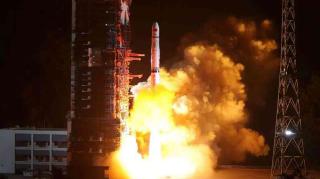China is planning to send Chandrayaan to the Moon in the South Pole

The south pole of the moon is a region dark. China has sent an artificial satellite suitable for the purpose of broadcasting space in order to monitor the region. Today, the satellite was sent to The Kuikiyoo from Sichuan Launch Center in Sichuan state. China's Space Research Authority (CNSA) says, this year the special satellite is being sent to an unprecedented mission.
Long march-4C, after 25 minutes of sending an artificial satellite to a rocket, it separated and started solar panel and communication antenna. It started to move towards the destination.
According to Xinhua Lihua, manager of artificial satellite project, Xinhua said that sending the satellite to China's southern pole and observing that region is being considered as a significant step. With the controller installed on Earth, the artificial satellite can broadcast the information of the moon. Based on the information that was broadcasted, a moon robot named Chechen-4 will be sent later this year. The name of the robot is named after the moon goddess of China's fairytale moon.
The South Pole, known as the dark side of the moon, is not visible directly from the Earth. Even after getting the first picture of 1959, there was no operation in the region. The robot named the Chechen-4 will run the South Pole Icon Basin. It will be the second lunar moon of China, landing on the moon. Earlier in 2013, the country sent a moonlight called Yatu.
Chinese researchers have assumed the failure of the Yatu voyage to discontinue contact at the beginning. However, after it became active, it started sending signals to the earth and sent signals from the moonlight for 31 months. Since then, China has begun to send another moon mission named CNC Chechen-5. It will be able to collect samples from the moon and bring it to Earth.
China is spending billions of dollars in its army-led space program. The country plans to send people to the moon in future by creating a space station by 2022.